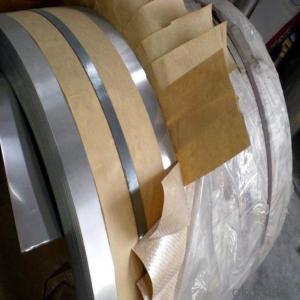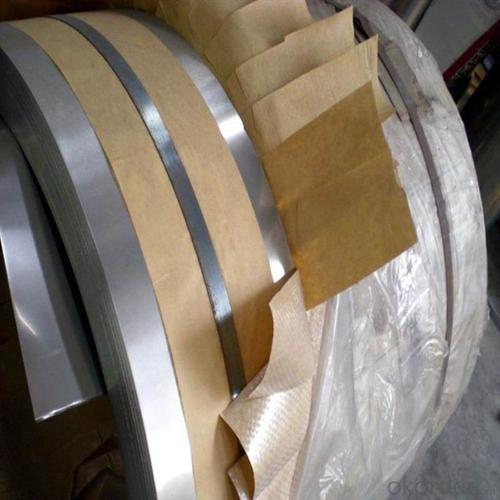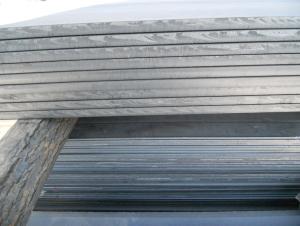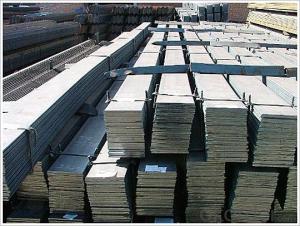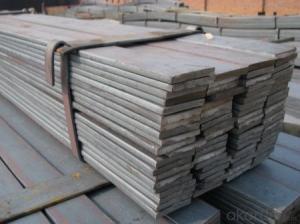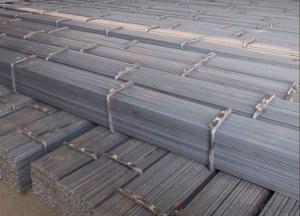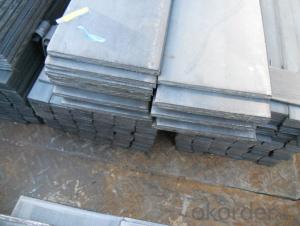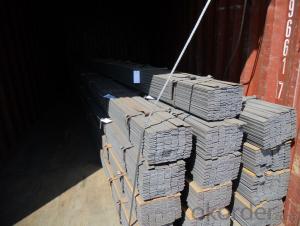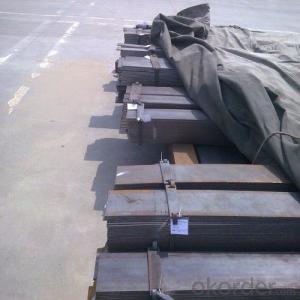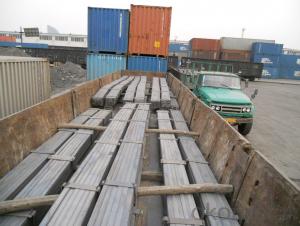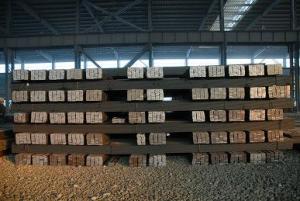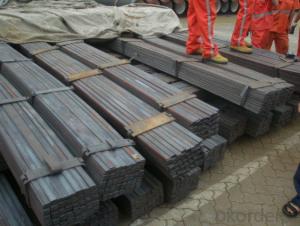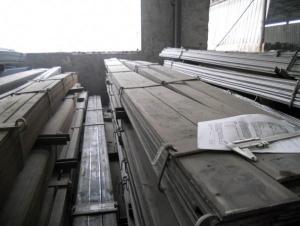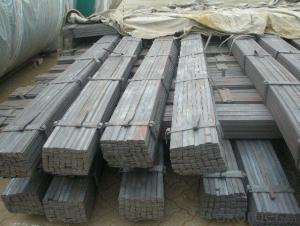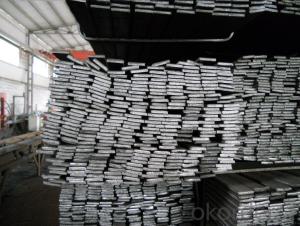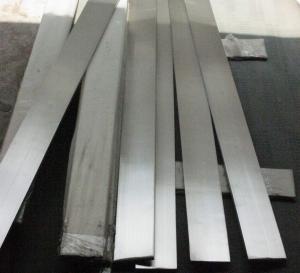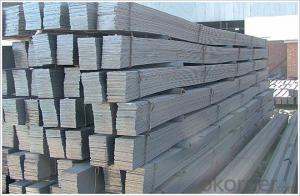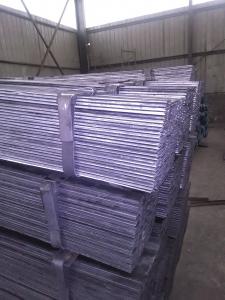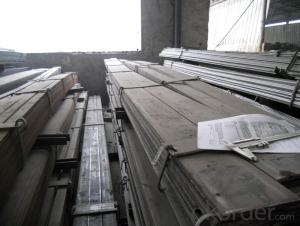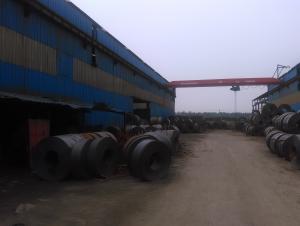High carbon spring steel hot rolled flat bar
- Loading Port:
- Tianjin
- Payment Terms:
- TT OR LC
- Min Order Qty:
- 1200 PCS
- Supply Capability:
- 24000 PCS/month
OKorder Service Pledge
Quality Product, Order Online Tracking, Timely Delivery
OKorder Financial Service
Credit Rating, Credit Services, Credit Purchasing
You Might Also Like
High Carbon Spring Steel Hot Rolled Flat Bar Specifications:
Spring flat steel for leaf spring:
1.Certificates:ISO9001/SGS/BV.
2. Supply ability:2000Tons/day
3. 22 years experience
Production Name | Spring Steel Flat Bar |
Steel Type | Spring Steel |
Material | 60Si2Mn |
Others Available Material | 60Si2Mn, SUP9, SUP9A, 55Cr3 etc. |
Thickness Range (mm) | 6-50 |
Width Range (mm) | 40-135 |
Usual length (mm) | 5800 |
Daily Capacity (Metric Ton) | 4000 |
Certificate | ISO9001: 2008 |
Edge | Round Edge / Right Angle |
Surface | None |
Usage | Leaf Springs, Cultivator Blades, Garden Tools, Knifes etc. |
Samples | Free of Charge |
- Q: What is the tolerance for thickness in steel flat bars?
- The tolerance for thickness in steel flat bars can vary depending on the specific industry standards and requirements. Generally, the tolerance for thickness in steel flat bars is typically specified in terms of a plus or minus value. For example, a common tolerance for thickness in steel flat bars could be +/- 0.005 inches. This means that the actual thickness of the steel flat bar can deviate from the specified thickness by up to 0.005 inches in either direction. However, it is important to note that the tolerance for thickness can be different for different grades and types of steel flat bars, as well as for different applications. Therefore, it is crucial to consult the relevant specifications and guidelines provided by the manufacturer or industry standards to determine the specific tolerance for thickness in steel flat bars for a particular application.
- Q: What type of steel is commonly used for flat bars?
- Flat bars made from mild steel are frequently utilized in construction, manufacturing, and other scenarios where a robust and dependable material is essential. This type of steel, known for its versatility and widespread availability, boasts impressive strength, durability, and ease of machining. Moreover, stainless steel is another steel variant regularly employed for flat bars, especially in situations demanding resistance against corrosion and staining. Consequently, stainless steel flat bars are extensively used in the food industry, architectural projects, and marine applications.
- Q: Can steel flat bars be used for manufacturing machinery or equipment?
- Yes, steel flat bars can be used for manufacturing machinery or equipment. Steel flat bars are versatile and have a wide range of applications in various industries, including manufacturing. They are commonly used for constructing machine frames, supports, brackets, and other structural components in machinery and equipment. Steel flat bars have excellent strength and durability properties, which make them suitable for withstanding heavy loads and high stress conditions. Additionally, their flat shape provides stability and allows for easy attachment of other components. Overall, steel flat bars are a reliable choice for manufacturing machinery and equipment due to their strength, versatility, and availability in different sizes and grades.
- Q: How do you determine the length of a steel flat bar?
- To determine the length of a steel flat bar, you can use a measuring tool such as a tape measure or a ruler. Place one end of the measuring tool at the starting point of the flat bar, then extend it along the entire length of the bar until you reach the opposite end. Make sure to keep the measuring tool straight and aligned with the edges of the bar for accurate measurement. Once you have reached the end, read the measurement displayed on the measuring tool to determine the length of the steel flat bar.
- Q: Are steel flat bars suitable for load-bearing shelves or brackets?
- Load-bearing shelves or brackets can be supported by steel flat bars, as they are known for their strength and durability. Steel is an excellent choice due to its ability to withstand heavy loads. The flat shape of these bars provides stability and makes installation easy. Moreover, steel flat bars are resistant to bending and warping, ensuring the shelves or brackets remain sturdy and secure. Furthermore, steel can endure various environmental conditions, making it suitable for both indoor and outdoor use. Consequently, steel flat bars are a dependable and pragmatic option for load-bearing shelves or brackets.
- Q: How do steel flat bars contribute to the strength and stability of structures?
- Steel flat bars play a crucial role in enhancing the strength and stability of structures in multiple ways. To begin with, their flat shape allows for a wide surface area, facilitating the even distribution of loads. Consequently, they can effectively bear heavy weights and resist bending or warping, making them particularly suitable for load-bearing applications like beams, columns, and trusses. Furthermore, the high tensile strength of steel flat bars enables them to withstand significant tension without breaking. This characteristic is of utmost importance in structural design, ensuring their ability to endure forces that pull them apart, such as those arising from earthquakes or strong winds. Moreover, the rigid nature of steel flat bars acts as a deterrent against excessive deflection or movement within structures. By functioning as stiffening elements, they effectively minimize any undesired bending or sagging, thereby enhancing the overall stability of the structure. Additionally, steel flat bars exhibit exceptional durability and corrosion resistance, making them highly suitable for use in diverse environments and weather conditions. This longevity guarantees that structures constructed with steel flat bars will maintain their strength and stability over an extended period. In conclusion, the incorporation of steel flat bars in construction significantly contributes to the strength and stability of structures. Their ability to provide even load distribution, high tensile strength, resistance to deflection, and durability make them a reliable and indispensable component in building structures capable of withstanding various external forces while preserving their integrity for years to come.
- Q: Can steel flat bars be used for making gardening tools?
- Gardening tools can indeed be made using steel flat bars. Steel, known for its durability and strength, is commonly utilized in the production of various tools, including those used for gardening. The malleability of steel flat bars allows for their easy manipulation and transformation into different types of gardening tools such as shovels, hoes, rakes, and trowels. These tools require the strength and stability provided by steel in order to effectively carry out their intended functions. Furthermore, steel's resistance to rust and corrosion makes it highly suitable for outdoor gardening applications where tools are frequently exposed to moisture and other environmental factors. All in all, steel flat bars are a versatile and dependable material option when it comes to creating gardening tools.
- Q: Can steel flat bars be used as reinforcement in concrete structures?
- Yes, steel flat bars can be used as reinforcement in concrete structures. Steel bars are commonly used in concrete construction to provide strength and durability to the structure. They are placed within the concrete to resist tensile forces and prevent cracking. Steel flat bars are particularly effective in providing increased flexural strength to the concrete, making them suitable for reinforcing beams, slabs, and other structural elements. The flat shape of the bars allows them to be easily embedded within the concrete, ensuring a strong bond between the two materials. Steel flat bars are available in various sizes and grades, allowing for customization based on the specific requirements of the concrete structure.
- Q: What is the maximum weight capacity of a steel flat bar?
- The maximum weight capacity of a steel flat bar depends on its dimensions and the grade of steel used. However, in general, steel flat bars can support significant weight loads and are commonly used in construction and industrial applications. It is best to consult the manufacturer or refer to engineering specifications for the specific weight capacity of a particular steel flat bar.
- Q: How do steel flat bars contribute to the overall efficiency of healthcare structures?
- Several factors contribute to the overall efficiency of healthcare structures, and steel flat bars are a significant element in achieving this. Firstly, the utilization of steel flat bars in the construction of healthcare facilities is widespread due to their exceptional strength and durability. This ensures that the buildings can withstand the test of time and provide a secure and safe environment for patients, staff, and equipment. Moreover, the versatility of steel flat bars allows for easy fabrication into various shapes and sizes, enabling efficient and precise construction. This flexibility enables healthcare structures to be designed and constructed according to specific requirements, optimizing the utilization of space and resources. Additionally, the fire resistance properties of steel flat bars are of utmost importance in healthcare structures, where the safety of occupants is a priority. By incorporating steel flat bars into the construction process, healthcare facilities can effectively minimize the risk of fire incidents and ensure the protection of patients and staff. Furthermore, the high load-bearing capacity of steel flat bars is essential in healthcare structures that require support for heavy equipment and machinery. This enables the buildings to accommodate advanced medical technology and infrastructure, such as MRI machines, surgical equipment, and patient lifts, without compromising the structural integrity. Lastly, the low-maintenance nature and resistance to corrosion of steel flat bars result in reduced need for frequent repairs and replacements. This not only saves costs but also minimizes disruptions to healthcare services, allowing medical professionals to focus on delivering quality care to patients. In conclusion, steel flat bars play a vital role in enhancing the efficiency of healthcare structures by providing strength, versatility, fire resistance, load-bearing capacity, and low-maintenance characteristics.
Send your message to us
High carbon spring steel hot rolled flat bar
- Loading Port:
- Tianjin
- Payment Terms:
- TT OR LC
- Min Order Qty:
- 1200 PCS
- Supply Capability:
- 24000 PCS/month
OKorder Service Pledge
Quality Product, Order Online Tracking, Timely Delivery
OKorder Financial Service
Credit Rating, Credit Services, Credit Purchasing
Similar products
Hot products
Hot Searches
Related keywords
